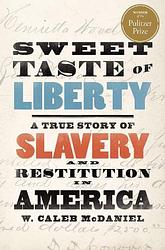Sweet Taste of Liberty: A True Story of Slavery and Restitution in America by W. Caleb McDaniel
This book tells the true story of a freed African American woman who was kidnapped and sold into slavery, and her fight for justice and restitution after the Civil War. It provides a detailed, personal account of her journey, legal battles, and the historical context of the time, shedding light on the injustices suffered by African Americans, even after they were legally freed. The narrative also explores the broader themes of racial inequality, reparations, and the lasting impacts of slavery on American society.
The 11271st greatest book of all time
Ranking Details:
Our ranking system awards points to books based on their appearance and position on curated lists. Here's how it works:
Unranked Lists: For lists without specific rankings, each book receives points equivalent to the list's weight. This approach recognizes the book's inclusion on prestigious lists.
Ranked Lists: Books on ranked lists receive points in two ways:
- Base Points: Initially, every book is awarded points equal to the list's weight, acknowledging its significance.
- Bonus Points: Additionally, books earn bonus points based on their ranking. The total bonus pool, equal to 100% of the list's weight, is distributed among the books, with higher-ranked books receiving more points.
Exponential Distribution: The distribution of bonus points follows an exponential model. This means the top-ranked book (#1) receives significantly more bonus points than those further down the list (e.g., #100). Our algorithm ensures that higher placements are rewarded more generously, reflecting the achievement of a top rank on any given list.
This scoring system ensures that each book's ranking reflects both its presence on multiple lists and its positions within those lists, providing a comprehensive measure of its acclaim and popularity.
Total Points: 1
Since this book was first published in 2019, there is a penalty of 72.0%. The age adjusted score is 0.28.
This is to prevent newer books from reaching super high on the ranked list of the greatest books of all time. The greatest books should also stand the test of time.
- score: 1 -- Pulitzer Prize for History (Weight: 1)

